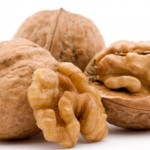Superfoods are all the rage these days. These superfoods are credited with weight loss, healthy living, and overall well-being. And one such superfood is quinoa. Quinoa, pronounced KEEN-wah, has been doing the rounds of the health circuit for quite some time now, but isn’t really as popular as it should be.
What is quinoa?

Image source: Pixabay, under Creative Commons License
Quinoa is a naturally gluten-free grain, which contains iron, vitamin E, B-vitamins, magnesium, potassium, calcium, phosphorous, fiber, and antioxidants. It is one of a very few plant-based foods that is considered a complete protein, because it contains all nine essential amino acids. It has a high protein to carbohydrate ration, in comparison to other grain products. Quinoa is cooked the same way as rice, and is versatile in that it can be used in a wide variety of dishes.
Suggested read: Top 15 cancer fighting foods you need to add to your grocery basket – Today!
History of quinoa
Quinoa is a grain crop cultivated for its edible seeds. Although its leaves are consumed as a leafy vegetable, its commercial availability is limited. Being a pseudocereal, quinoa is closely related to species like beetroots, tumbleweeds, and spinach. It belongs to the goosefoot genus (Chenopodium quinoa), and can be traced back to the area surrounding Lake Titicaca in the Andean region of Bolivia, Peru, and Chile.
Although it was successfully domesticated 3,000 to 4,000 years ago for human consumption, archaeological evidence points to its use for pastoral herding some 5,200 to 7,000 years ago. The ancient Incas hold the crop sacred, and even referred to it as chisoya mama, or ‘mother of all grains.’
Types of quinoa
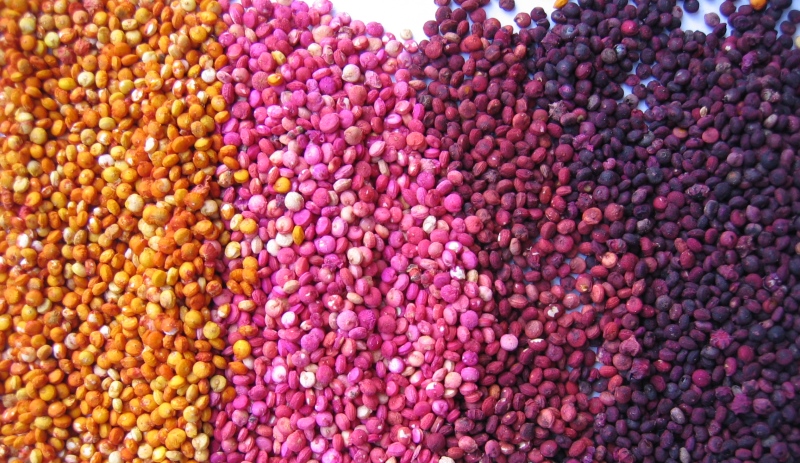
Image source: Google, copyright-free image under Creative Commons License
There are hundreds of cultivated types of quinoa today, but the most commonly available versions are white, red, and black quinoa. White quinoa is the most common type available in stores, and is often just referred to as quinoa. It’s even referred to as ivory quinoa by some people. Red quinoa is known to hold its shape even after cooking, which isn’t the case with white quinoa. Black quinoa holds its rich black color even when cooked, and is a bit sweeter and earthier to taste than white quinoa.
Quinoa has something called saponin, which is a naturally bitter-tasting coating on the grain, that keeps insects and other bugs away without having to resort to pesticide usage. This saponin coating can be easily removed by rinsing the grains with water before cooking.
Health benefits of quinoa
UN’s Food and Agricultural Organization has declared the year 2013 as ‘The International Year of the Quinoa.’ So if you were looking to switch from rice to quinoa, we are going to give you a lot more reasons to do so, by stating ALL the health benefits of quinoa, that you might not be aware of. Let’s get to it, shall we?
1. It’s very nutritious.
One cup (185 grams) of quinoa contains all these rich nutrients:
- Protein: 8g
- Fiber: 5g
- Manganese: 59% of daily value
- Copper: 40% of daily value
- Phosphorous: 40% of daily value
- Magnesium: 30% of daily value
- Folate: 19% of daily value
- Zinc: 18% of daily value
- Potassium: 9% of daily value
- Over 10% of daily value in vitamins B1, B2, and B6
This amounts to about 222 calories, with about 39g of carbohydrates and 4g of fat.
2. Contains all amino acids.
As mentioned above, quinoa is one of the few plant foods that boasts of all nine essential amino acids. If you don’t eat meat, quinoa is a pretty awesome food source that’s protein-rich and can satisfy all your protein intake by this alone.
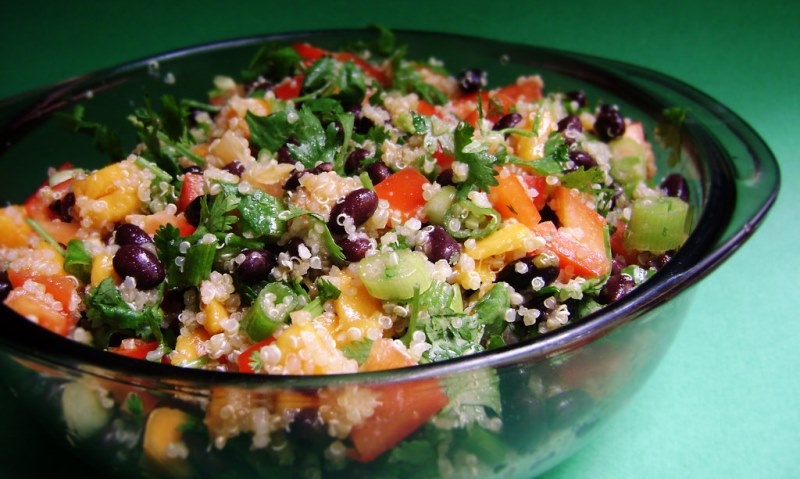
Image source: Google, copyright-free image under Creative Commons License
3. Contains high fiber content.
Quinoa boasts of fiber content twice as much as most other grains. And you know why you need fiber in your food intake? To prevent, and even relieve, constipation. It’s one of the most painful things to be constipated. Besides that, quinoa also helps prevent diabetes by lowering glucose levels, and heart disease by lowering high blood pressure and cholesterol. It also helps lower the risk of developing hemorrhoids, and since it has fewer calories than other foods for the same volume, it also helps in weight loss.
4. It is gluten-free.
Many people are allergic to gluten, and people with celiac disease are recommended a diet free of gluten, due to severe gluten intolerance. A gluten-free diet is healthy, as long as it contains foods that are naturally gluten-free, as opposed to packaged foods that are stuffed with refined starches instead. One more thing: gluten-free junk food is still junk food. So quinoa is one of the safest options available, that is naturally gluten-free and has higher nutrient and antioxidant value than control gluten-free products.
5. Contains high iron content.
Iron is essential for keeping our red blood cells healthy, and it also helps in hemoglobin formation. It’s iron that is essential to carry oxygen from one cell to another, and also that which supplies oxygen to our muscles that aid in contraction. Our brain takes about 20% of our blood oxygen, and iron is vital because it increases brain function. Other benefits of iron in your system are that it regulates body temperature, enzyme activity, and energy metabolism. It also aids in neurotransmitter synthesis.
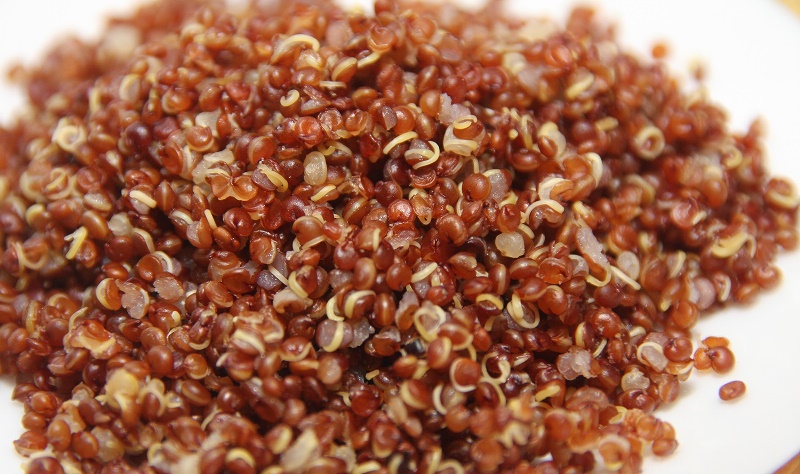
Image source: Google, copyright-free image under Creative Commons License
6. Contains lysine.
Lysine is a special amino acid that is present in quinoa. It is said to boost and strengthen the immune system. It has also been proven to raise serotonin levels, which majorly contributes towards feelings of well-being and happiness.
Suggested read: Top 10 WORST foods that hinder weight loss
7. Has low glycemic levels.
The glycemic index is used to measure how quickly foods raise blood sugar levels, and quinoa ranks low on this index, with a score of 53. That means it helps stabilize the blood sugar levels. On the other hand, foods with high glycemic levels fluctuate blood sugar levels, stimulate hunger, and even contribute to obesity. Such foods are what are associated with lifestyle diseases like type 2 diabetes and heart disease. So if you’re trying to avoid getting diabetes, quinoa should be a must on your must-eat list of foods.
8. Contains high content of magnesium.
Although magnesium is rarely talked about, it’s still a pretty important mineral for the body. It mainly helps prevent heart disease by balancing blood pressure, helping with diabetes by promoting healthy blood sugar levels, and osteoporosis. It alleviates migraines by helping relax blood vessels. It also helps in body temperature regulation, nerve impulses, energy production, detoxification, and the formation of healthy bones and teeth.
9. Contains high content of manganese.
Energy production at the cellular level happens because of mitochondria, and these get damaged. This damage is prevented by manganese, which is an antioxidant. It also protects red blood cells and other cells from injury by free radicals.
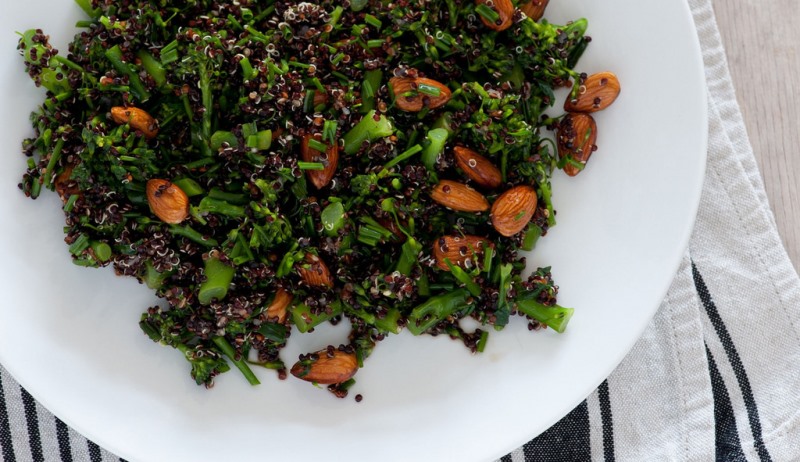
Image source: Google, copyright-free image under Creative Commons License
10. High content of riboflavin.
Vitamin B2 is also known as riboflavin, and is a part of the family of B vitamins. It’s responsible for providing antioxidants that help the body with a number of functions. It helps with enzyme performance and oxygen delivery throughout the body. It also improves energy metabolism inside the brain and muscle cells.
11. Promotes proper liver function.
Health benefits of quinoa include proper liver function. The zinc content in quinoa helps fulfill the body’s requirement by 18% of daily value. In general, zinc provides normal cell growth, differentiation, and development. Since zinc deficiency has been seen in patients suffering from liver disease, they are recommended a dose of zinc treatment. So if they include quinoa in their daily food intake, it will help them.
12. Has flavonoids.
Flavonoids are compounds found in berries, which help prevent cardiovascular disease and other inflammatory conditions. These flavonoids are present in high amounts in quinoa, hence it’s a great addition to your daily diet, if you want to keep heart disease and arthritis at bay.
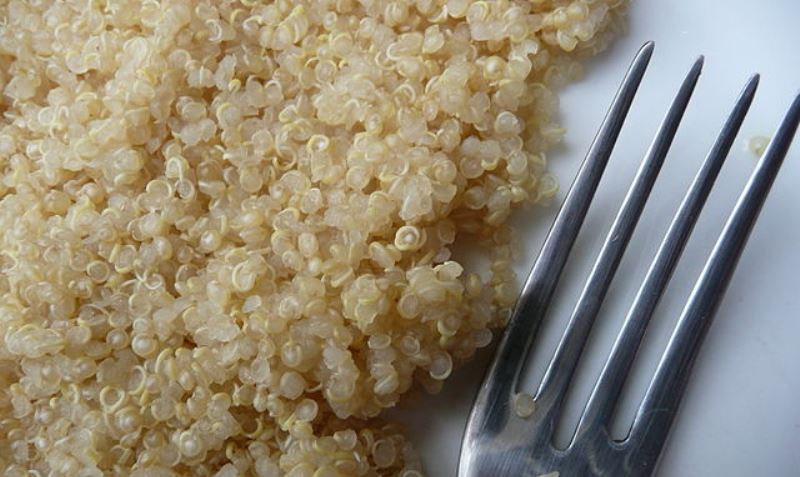
Image source: Google, copyright-free image under Creative Commons License
13. Helps in weight loss.
Quinoa is a superfood for one particular reason that is exciting: the fiber in quinoa helps the body get rid of unnecessary fat, while helping you eat less by making you feel fuller for longer periods of time. The high fiber content helps the digestive system as well. In essence, quinoa helps solve two problems: a) quickening a sluggish digestive system, and b) solving overeating by making you feel fuller for longer.
14. Helps balance blood sugar levels.
Quinoa helps in keeping diabetes at bay, by helping keep blood sugar levels under control. If you’re already suffering from diabetes, it can help bring down to a point where it fluctuates in the normal range. Also, since a person already suffering from diabetes is recommended to forego certain foods like rice, they can use quinoa as a substitute, since it’s a pretty versatile grain.
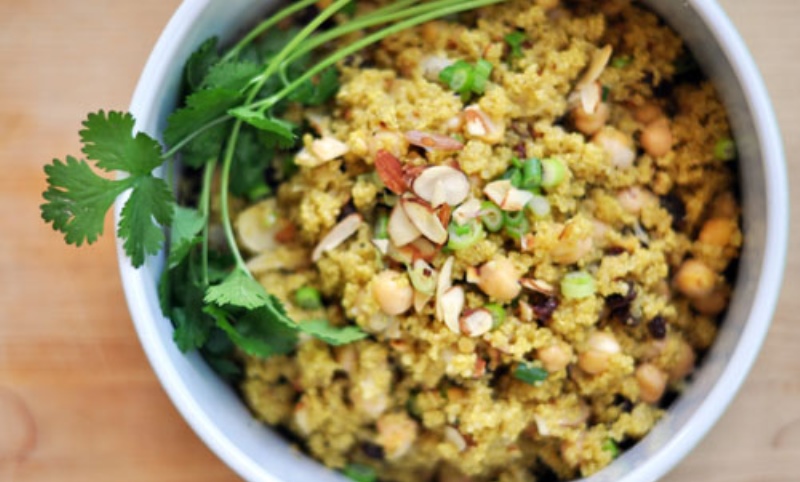
Image source: Google, copyright-free image under Creative Commons License
15. Helps lower blood pressure.
High blood pressure is bad for cardiovascular health. The fiber content in quinoa can have a direct effect on lowering blood pressure. And, in general, foods with good fiber content are not very appetizing. But that’s not the case with quinoa. So you can incorporate it into any dish of your choice and lower your blood pressure by not forgoing good taste.
Suggested read: Stay healthy with these easy-to-cook immunity boosting foods
16. Helps lower cholesterol.
Another thing that impacts cardiovascular health is cholesterol levels. Doctors prescribe cholesterol-lowering drugs. But with your doctor’s guidance and certain dietary changes to include quinoa into it, you can make a significant dent in the cholesterol levels.
These are some of the most amazing health benefits of quinoa. If these don’t persuade you to include quinoa into your daily diet, I don’t know what will!
Featured image source: Google, copyright-free image under Creative Commons License







